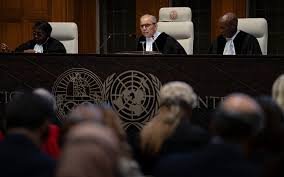The top United Nations court ordered Israel on Friday to immediately halt its military operations in the southern Gaza city of Rafah — but stopped short of ordering a full cease-fire. While Israel is unlikely to comply with the order, it will ratchet up the pressure on the increasingly isolated country.
Criticism of Israel’s conduct in Gaza has been growing, particularly on operations in Rafah — and even from its closest ally, the United States. This week alone, three European countries announced they would recognize a Palestinian state, and the chief prosecutor for another U.N. court requested arrest warrants for Israeli leaders, along with Hamas officials.
Israeli Prime Minister Benjamin Netanyahu is also under heavy pressure at home to end the conflict, which was triggered when Hamas-led militants stormed into Israel, killing 1,200 people, most civilians, and taking some 250 captive. Thousands of Israelis have joined weekly demonstrations calling on the government to reach a deal to bring the hostages home, fearing that time is running out.
While the ruling by the International Court of Justice is a blow to Israel’s international standing, the court does not have a police force to enforce its orders. In another case on its docket, Russia has so far ignored a 2022 order by the court to halt its full-scale invasion of Ukraine.
Ahead of the ruling, Israel signaled it, too, would brush off an ICJ order to stop its operations.
“No power on earth will stop Israel from protecting its citizens and going after Hamas in Gaza,” Avi Hyman, the government spokesperson, said in a press briefing Thursday.
The court’s president, Nawaf Salam, read out the ruling, as a small group of pro-Palestinian protesters demonstrated outside.
Fears about an operation in Rafah have “materialized,” the ruling said, and “the humanitarian situation is now to be characterized as disastrous.”
The court also ordered Israel to keep the Rafah crossing into Egypt open “for unhindered provision at scale of urgently needed basic services and humanitarian assistance.”
The court did not call for a full cease-fire throughout Gaza as South Africa, which brought the case, had requested at hearings last week.
The cease-fire request is part of a case filed late last year, accusing Israel of committing genocide during its Gaza campaign. Israel vehemently denies the allegations. The case will take years to resolve, but South Africa wants interim orders to protect Palestinians while the legal wrangling continues.


